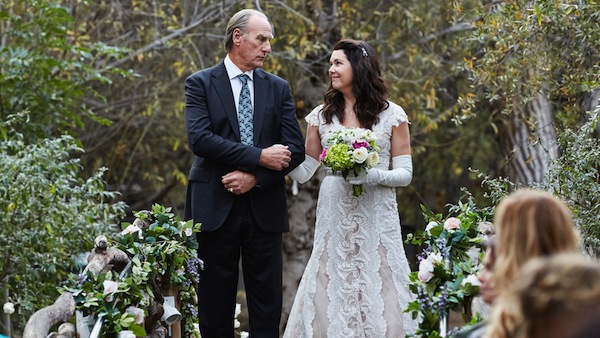
Pretty sure we’ve never issued a spoiler warning at the top of a weekender, but here goes. The biggest story of the week is the series finale to Parenthood, so if you haven’t seen it, skip to item 2. And may God bless and keep you always.

1. One of the lectionary readings this past Sunday was a passage from 1 Corinthians in which the apostle Paul writes that “the present form of this world is passing away.” He may have been talking eschatology but the line kept coming to mind while watching the series finale of Parenthood last night (and while finally catching Boyhood a week earlier). It was one emotional an hour of television!
Many would say the show has been in decline for the past couple of seasons, and I’d agree. Not that it was ever as ‘pitch-perfect’ or subtle as its older brother Friday Night Lights. But it was always going to suffer in comparison to that singular triumph. Parenthood is a different beast, and you either accepted that or stopped watching. Nevertheless, these past couple of seasons, with the mayoral campaign and Luncheonette storylines, the show has resembled nothing more closely than the lackluster second season of FNL. You know, the season where all the characters were still there, but the plotting got ridiculous. Or maybe it was more than that. Maybe there was too much catharsis in the first three seasons of Parenthood for the characters to remain compelling. Todd Vanderwerff put it this way over at Vox:
In the final two seasons, [Parenthood] was simply unable to come up with any larger stories to compensate for the fact that everybody was basically okay on a micro-scale.
Anyway, this final half-season has been a treat. The show had a history of making its worst points into its best, and that’s part of what happened this year. For example, the Joel and Julia storyline that felt so ‘off’ last year turned into the most powerful part of this one. Their reconciliation could have felt cheap or manipulative, but it didn’t. It felt hopeful. And that’s probably what I admire most about Jason Katims. When he sees an opportunity for something believably good, he goes for it. It doesn’t always work, but that’s because it’s so much harder to pull off uplift than cynicism. Which is what we got in the final episode. Uplift I mean. Just when you thought he couldn’t wring any more catharsis out of these Bravermans, he did. People accuse the show of being sentimental, but I wonder if that’s just an expression of our cultural discomfort with sincerity. It has sentiment galore, but sentimental? Well, maybe a little. But the small screen will be a poorer place without our weekly dose of Katims-style abreaction. I may have to start watching About a Boy again! (In the short term, Togetherness has been showing more and more potential, family drama-wise).
Anyways, our take on Parenthood has always focused on the grace element, and they didn’t skimp on us last night. A few favorite moments:
 – A good deal of the show has been about what happens when someone believes in us when we don’t believe in ourselves, and Jasmine sort of summed it all up when she said to Crosby, “I told you I believed in you and I meant it.”
– A good deal of the show has been about what happens when someone believes in us when we don’t believe in ourselves, and Jasmine sort of summed it all up when she said to Crosby, “I told you I believed in you and I meant it.”
– When it comes to surprising acts of self-sacrifice, Zeek and Camille inviting Amber to live with them got my tearducts pumping. “You are our third act.” Wow.
– In fact, Camille ended up really coming forward in these final episodes. The moment at the hospital in the penultimate episode (I think) when she breaks down was one of the best scenes of the year. That it happens–literally–at the foot of the cross blew my mind. And lest we get hung up on the ueber-secular funeral (one of the only false notes imho, not cause it was areligious, more cause it seemed too jovial), the title of the episode was the Dylantastic “May God Bless and Keep You Always”. Amen to that.
– Then there’s the simplicity of Drew’s wedding toast which refrained from any fireworks. Instead it went for simple and a little awkward, which is what love ultimately is, no? Much like Hank’s on-campus vulnerability, another highlight (Ray Romano deserves an award for his acting).
– The way they brought Ryan back in during the final montage made me smile. It may be a bit on the wishful side, but in Katims’ economy, even the losers aren’t forgotten. The grace at the heart of this family reaches outward–that is simply its nature. Also, seeing Jason Street pop up as Amber’s new husband was icing on the cake.
– Finally, there was Joel and Julia, always the most ‘controlled’ of the couples, who we see surrendering to the messiness of life and love in those closing scenes, welcoming not just two more children but a puppy. The joy borders on sanctifying. And the adoption line from Joel, “she was always ours”, will no doubt be cropping up in sermons across the nation soon.
– Oh and the music. Yes it was cheesy, but there were some great songs mixed in. Especially the 100-proof gospel goodness of Damien Rice’s new tune, “Trusty and True” (listen for the coda):
2. Shifting gears, guess I wasn’t the only one who decided to comment on “political correctness” this week! The online response has been enough to make you wonder how much of the whole issue is a function of the Internet and the impersonal communication it affords. Anyway, David Frum’s response in The Atlantic is worth reading, “Liberals and the Illiberal Left”, for the graph of ‘disinvitation incidents’ if nothing else. Megan Garber also had some admittedly (over-)optimistic things to say in that publication, but at least she gives voice to the utopian underpinnings. The story they ran elsewhere about Seattle shaming its residents into composting won’t do anything to pacify those decrying the ends-justifying-the-means mentality that has snuck into these discourses, ht WTH.
3. On the productivity (cult) tip, The Science of Us gave a timely and surprisingly touching eulogy for the Adult Snow Day, which technology appears to have made obsolete–a definite downside of “working remotely”. The final paragraph got to me:
The grown-up world has a tendency to strip things of their magic a bit, but the snow day still served as a wonderful stop sign from the heavens for myopic, overworked adults. What else could grind to a halt, even temporarily, the exhausting, striving adult world of meetings and reports and office memos? What else could not only suggest to the workaholic that he take a day off, but force him to because the roads were too icy, the subways all closed? What else could unite father and son on a sled on a snowy hill in the middle of a weekday? In a world that forces us to inhabit our roles as workers ever more intimately — one in which time actually off from work has been shrinking for decades, where it’s easy to forget that there’s more to life than what it says on our business cards — snow days were one of the few remaining excuses not to be a worker for a little while. I’m going to miss them, even if I haven’t really had much time to think about it.

Happy 30th birthday to “We Are The World”! Have a Bud.
4. Along related lines, theologian R. Scott Clark wrote a helpful article for his Heidelblog in which he asked, “Is Efficiency a Virtue in the Church?” His answer is predictably wise (that site is a gem!), and along the way he dropped quite a telling observation, namely, when it comes to intinction during communion, the hygiene line may be a red herring:
One place I’ve seen the influence of “efficiency” in P&R churches in recent years is the (to me) surprising popularity of the use of intinction in the administration of communion. Intinction is the practice of dipping communion bread into the wine so that the communicant receives wine-soaked bread rather than the cup in communion. Lane Keister has written a good introduction to this question. What’s the connection between the turn to intinction, efficiency, and church growth? Rick Phillips explains, “more than one minister who emphasizes weekly communion told me that intinction was necessary because the biblical procedure takes too long.” I’ve observed intinction in several P&R congregations over the last 5 years or so and the only rationale I can see for abandonment of the cup in the administration of communion and the use of intinction is that it takes too long.
5. Social Science Study of the Week: “Employees fake a positive outlook when the boss is around” via The Wall Street Journal, ht BG.
6. Humor: “Three Brothers Re-Created Old Photos To Make This Epic Calendar For Mom” wrings some serious laughs out of lectionary reading mentioned in item one (e.g. below). The Onion gave us “Man Figures He Has 2 More Bites Of Roommate’s Leftovers Before It Noticeable”. McSweeney’s “Words That Could Conceivably Be Used to Describe Both the Super Bowl and a Superb Owl” (personal fave would have to be “bone-crunching”). Finally, in the this-really-happened file, a friend in law school turned up the 1971 court case, United States ex rel. Gerald Mayo v. Satan and His Staff. Attorneys in need of a “Practitoners Guide for Suing the Devil”, you’re welcome, ht EB.

7. Our friends at Liberate overhauled their website this week (just in time for the annual conference – two weeks away!), and it looks great. One of the first posts to go live in the new format, is Tullian Tchividjian’s terrific wheelhouse reflection, “The Focus Has Shifted”:
The gospel is the good news announcing Christ’s infallible devotion to us in spite of our lack of devotion to him. The gospel is not a command to hang onto Jesus. Rather, it’s a promise that no matter how weak your faith may be in seasons of spiritual depression, God is always holding on to you.
Martin Luther had a term for the debilitating danger that comes from locating our hope in anything inside us: monstrum incertitudinis (the monster of uncertainty). It’s a danger that has always plagued Christians since the fall but especially Christians in our highly subjectivistic age. And it’s a monster that can only be destroyed by the external promises of God in Jesus.
8. The NY Times Magazine finally wrote up BBC’s Black Mirror, the Twilight Zone-like TV series that’s recently become available on Netflix. Anyone who’s watched it–and I’m a huge fan–knows how inventively it filters ‘low anthropology’ through the sheen of the techno-solutionism. In other words, to say that it is not uplifting would be a supreme understatment. The following paragraph captures one of creator/writer Charlie Brooker’s chief insight:
The sly ingenuity of “Black Mirror” is that it nails down our love for the same devices we blame for our psychological torment. Brooker understands that even as we swear off tweeting and promise to stop Googling our exes, our phones are still the last things we see before falling asleep and the first things we reach for when we awaken.
9. Last but not least, in music, his royal Bobness gave his first interview in three years to the… AARP. And they even put him on their cover. It’s a great interview–his comments on happiness toward the end are especially poignant. Speaking of Dylan, though, his bassist from the gospel years, Tim Drummond, died this week. Here they are getting down together at the Grammys in 1980. PtL, ht KW:
Strays:
– The New Yorker put up an eye-opening photo essay on Internet Addiction in China.
– Eddie Murphy is returning to SNL!
– We’ll be sending out giving statements this coming week. Thanks for your patience.

COMMENTS
2 responses to “Another Week Ends: Parenthood Finale, Disinvitation Graphs, Snow Day Decline, Intinction Efficiency, Black Mirror, Dylan and We Are The World”
Leave a Reply













DZ – love the take on the Parenthood funeral. I’ve been to several “celebratory about a life poured out for Jesus” funerals with no undercurrent of sadness (really) that accounts for the b*stard that death is for those left behind. Even when those funerals are “Christian” they lack nuance and a theology of the cross, even if it’s a funeral for the more virtuous among us.
As you said, the Parenthood funeral was a secular version of that. It was still cool though and I’m a sucker for baseball and an eternal field of dreams, so I kind of dug it, but I’m so with you on the missing piece.
Also completely agree on Ray Romano – hello, Emmy’s? My favorite moment? – the audacity for a parent to call one of their 4 children “their” favorite. Scandalous, yet perfectly appropriate.